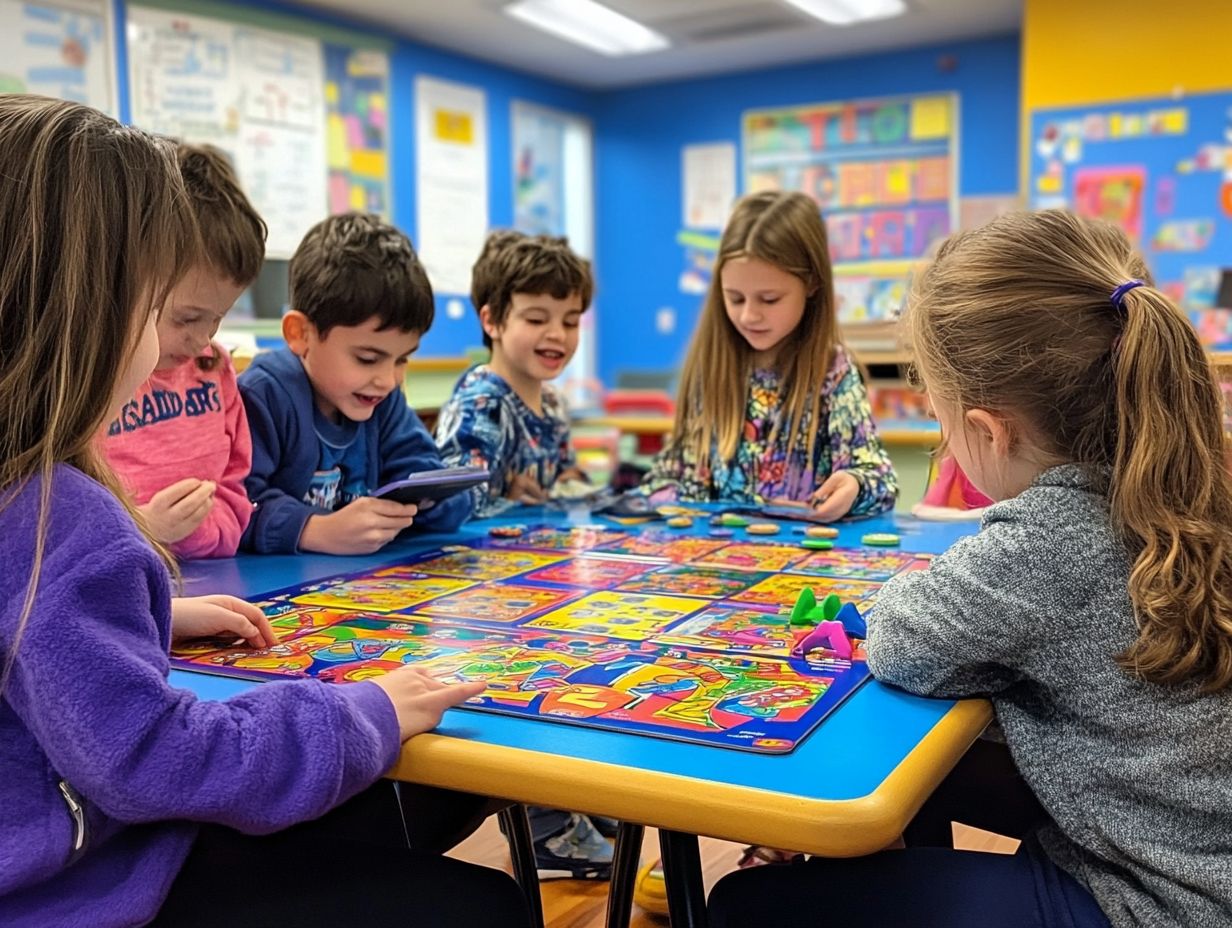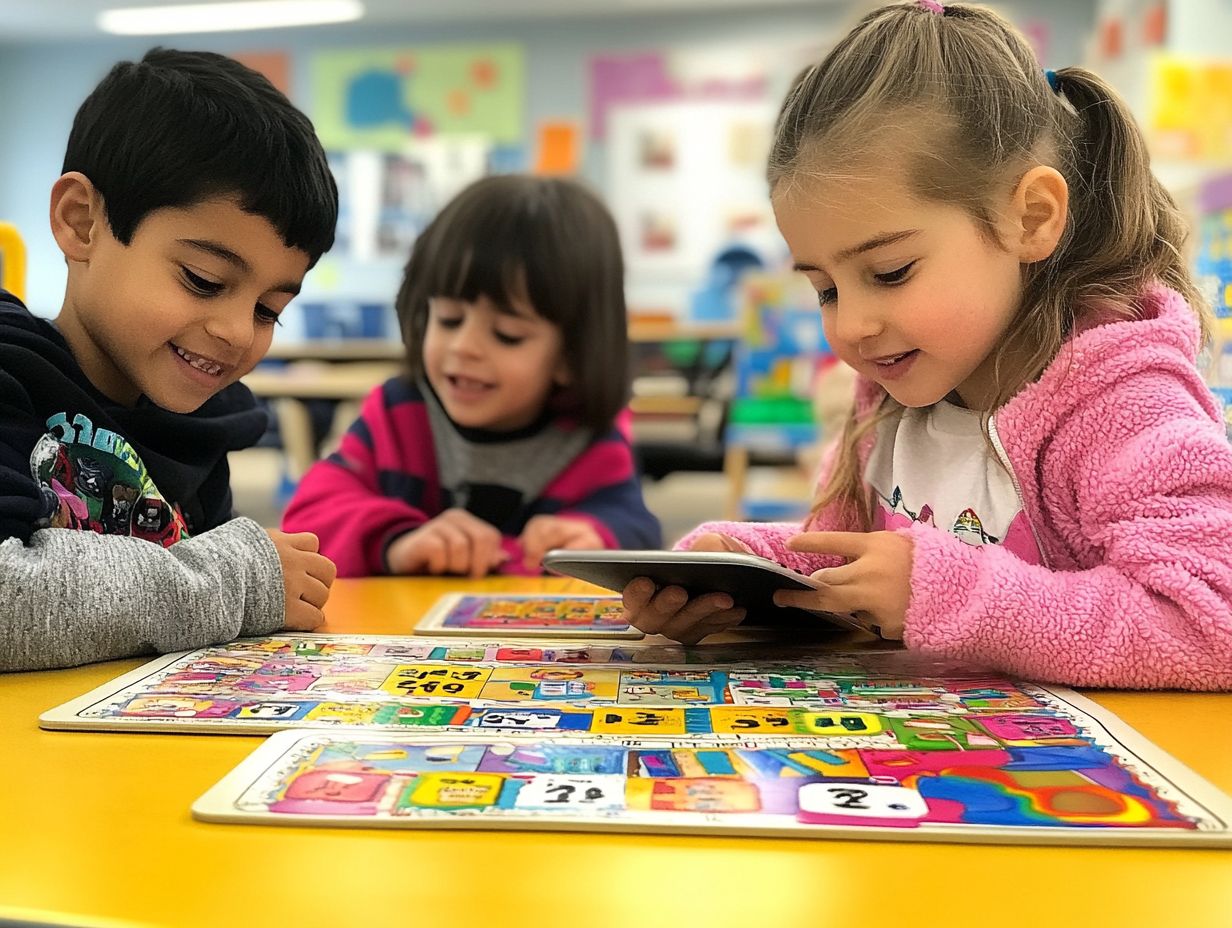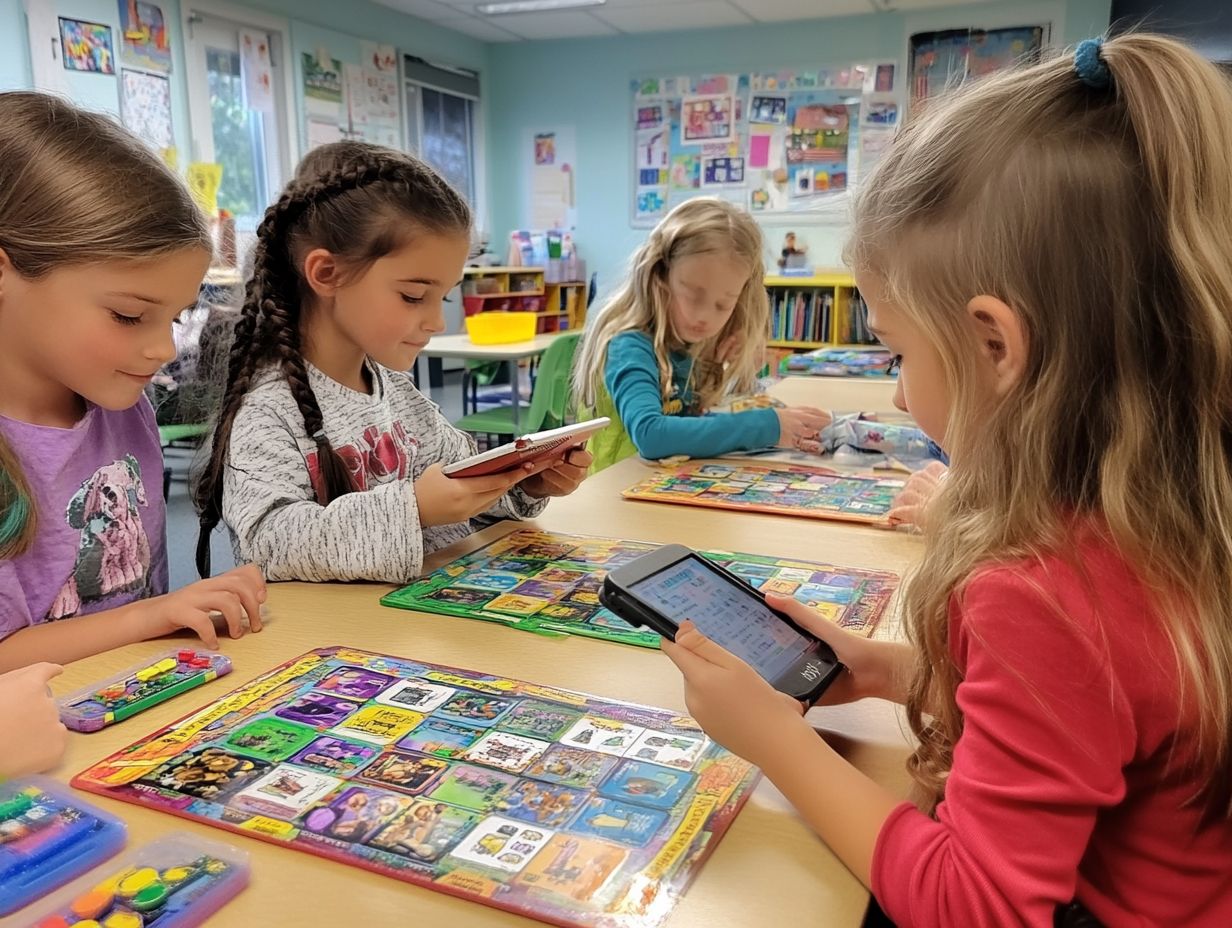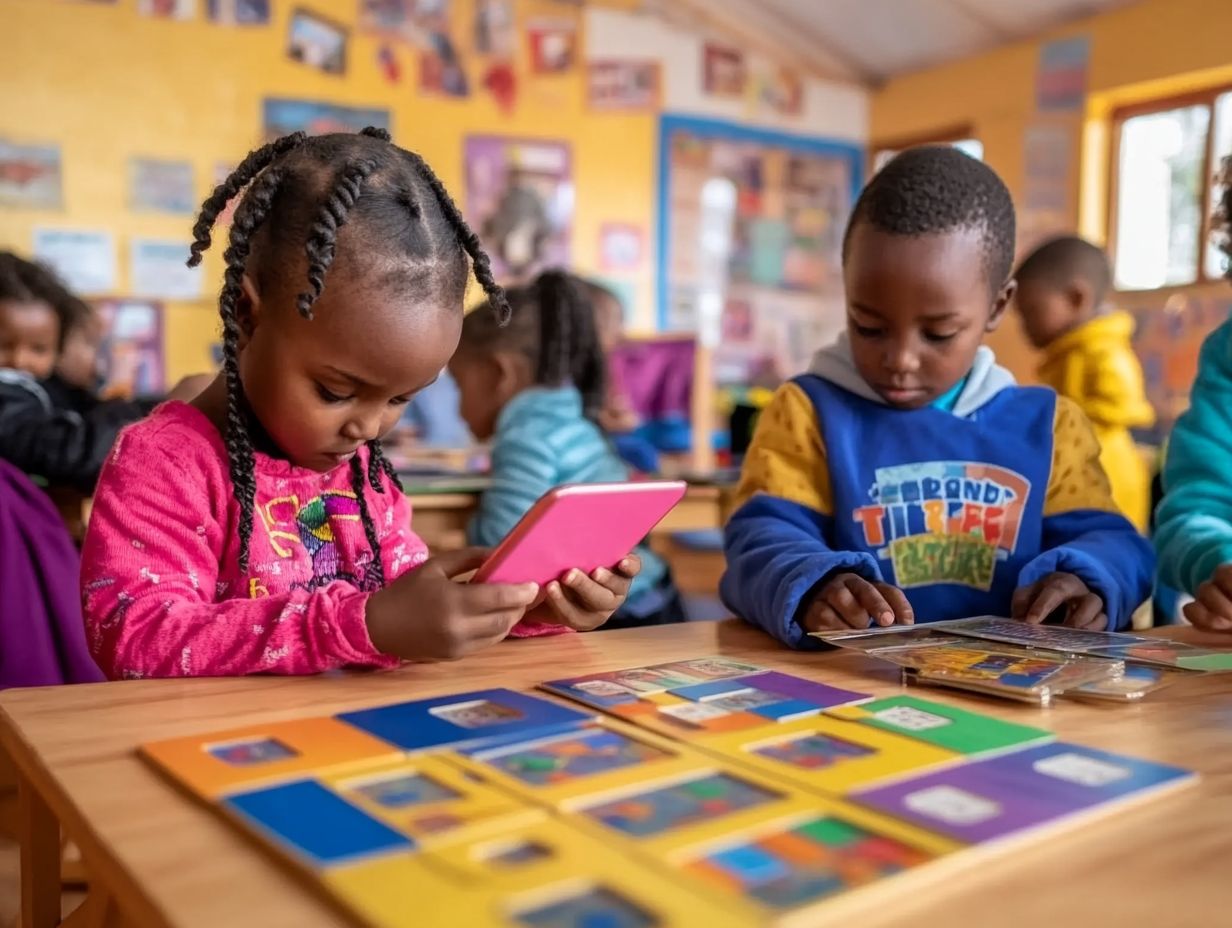In the contemporary digital landscape, educational games serve a vital function in the development of young minds. They not only offer an enjoyable diversion but also facilitate learning in an engaging manner.
This article examines the various categories of educational games—ranging from interactive and board games to online platforms—emphasizing their significance in enhancing cognitive skills and promoting social development.
Additionally, the article will address key factors to consider when selecting appropriate games, along with a presentation of some of the top educational games for children, ensuring a blend of learning and enjoyment.
Why Educational Games are Important

Educational games play a vital role in the academic and developmental journey of children, serving as interactive tools that enhance learning outcomes while promoting cognitive development through engaging and enjoyable activities.
By integrating educational games into early childhood education, children can cultivate essential skills such as problem-solving, critical thinking, and creativity, all while enjoying the learning process.
These games provide a unique opportunity to transform traditional educational methods into enjoyable experiences, encouraging children to explore various subjects, including mathematics, science, and language, in an immersive manner.
Play-based learning fosters a natural curiosity and an intrinsic desire to investigate the world around them. Through interactive games, children are motivated to pose questions, formulate hypotheses, and seek solutions, which leads to a deeper understanding and retention of academic concepts.
The dynamic nature of these games captures children’s attention, making the learning process less of a chore and more of an adventure.
By utilizing educational games, educators can tailor their lessons to accommodate diverse learning styles, ensuring that each child engages with the material in a meaningful way. These tools are not merely about enjoyment; they play a critical role in shaping well-rounded, knowledgeable individuals.
Types of Educational Games
The landscape of educational games is varied, encompassing a wide range of types that address different learning styles and preferences, thereby making the educational process a more enjoyable and engaging experience for children.
From interactive games that promote cognitive skill development through hands-on learning to traditional board games that foster teamwork and social skills, numerous opportunities exist to seamlessly integrate learning into play.
Furthermore, online games, including educational applications and digital learning platforms, enhance accessibility and engagement, offering children options that can significantly improve their academic skills in subjects such as mathematics, science, and language.
Interactive Games
Interactive games are innovative tools that promote engagement and participation among children, effectively combining entertainment with educational value to enhance their learning experiences. These games utilize technology to create immersive scenarios where children can develop cognitive skills, practice problem-solving, and apply critical thinking in a dynamic environment.
By integrating elements of gamification, interactive games capture children’s attention and inspire them to explore various subjects, transforming learning from a mere obligation into an enjoyable adventure.
Moreover, through the incorporation of cooperative learning, these games encourage teamwork and communication among peers, facilitating valuable exchanges of perspectives. Interactive games also provide a platform for enhancing media literacy, equipping children with essential skills to navigate information effectively in the digital age.
The feedback mechanisms embedded within these games offer immediate responses to the decisions made by players, fostering a growth mindset and enabling children to reflect on their strategies. Ultimately, the combination of entertainment and education creates an enriching experience that not only cultivates knowledge but also nurtures vital life skills.
Board Games
Board games have historically served as an essential component in educational environments, offering a hands-on and interpersonal learning experience that promotes social skills and cooperative learning among children. Unlike digital interactions, board games foster genuine communication, teamwork, and strategic thinking, rendering them invaluable tools for cultivating critical analysis and problem-solving abilities.
Through collaborative gameplay, children learn to navigate challenges, make informed decisions, and adapt to their peers’ dynamics, all while enjoying engaging and meaningful interactions.
These interactive activities not only enhance cognitive skills but also encourage constructive play, wherein children are motivated to work together towards shared objectives. The cooperative nature of board games assists students in developing empathy, patience, and conflict resolution skills as they engage within a supportive environment.
As children participate in these games, they gain a deeper understanding of teamwork, recognizing the significance of mutual support and valuing diverse perspectives.
This form of interactive learning fosters a positive atmosphere that nurtures stronger connections among peers, facilitating effective communication and camaraderie that extends beyond the classroom setting.
Online Games
Online games have transformed the manner in which children engage with educational content, providing a variety of platforms that effectively combine entertainment with learning across numerous subjects.
The emergence of educational applications and e-learning platforms has enabled children to access a vast array of resources designed to enhance their academic skills while also developing critical cognitive and problem-solving abilities.
These games offer both flexibility and accessibility, accommodating various learning styles to facilitate participation and success in each child’s educational journey.
The incorporation of adaptive learning technologies within online gaming environments creates personalized experiences that can significantly enhance learning outcomes.
By utilizing data to identify individual strengths and areas needing improvement, these platforms can customize challenges and rewards, thus cultivating a more engaging environment.
Furthermore, virtual learning environments promote collaboration and healthy competition among students, thereby fostering social skills alongside academic development.
In today’s rapidly evolving landscape, the role of online games in education has become not only advantageous but also essential, transforming learning into an interactive experience that equips children for the complexities of the future.
Benefits of Educational Games for Kids

The advantages of educational games for children extend well beyond simple entertainment; they serve as effective tools for enhancing cognitive skills and promoting social development in an engaging environment.
Through participation in these games, children can improve their problem-solving abilities, critical thinking, and creativity while acquiring knowledge in an enjoyable and motivating setting.
Additionally, educational games foster collaboration and social skills, enabling children to work together and cultivate emotional intelligence as they confront challenges and celebrate achievements within the context of the game.
Improving Cognitive Skills
Educational games are highly effective in enhancing cognitive skills, as they encourage children to engage in critical thinking, problem-solving, and memory enhancement through interactive play.
These games not only foster critical thinking abilities but also promote self-directed learning, allowing children to take ownership of their educational experiences. By presenting various levels of challenges, players are required to engage in exploration and experimentation, which contributes to improved knowledge retention.
Navigating through virtual scenarios helps to develop essential skills such as decision-making, spatial awareness, and teamwork.
This combination of enjoyment and learning creates a dynamic environment where children can discover and apply new concepts, thereby establishing a solid foundation for their future academic and social pursuits.
Enhancing Social and Emotional Development
Educational games play a significant role in enhancing social and emotional development, offering children opportunities to practice teamwork, empathy, and communication skills within a structured setting.
Through collaborative gameplay, children learn to navigate social dynamics, respect diversity, and resolve conflicts—skills that are essential for building healthy relationships.
These games frequently incorporate scenarios that promote emotional intelligence, enabling children to explore their feelings and understand the perspectives of others while engaging in enjoyable activities.
As children interact with their peers, they not only enhance their social skills but also develop cultural awareness, fostering connections with classmates from diverse backgrounds.
This exposure promotes inclusivity and community building, encouraging children to appreciate differences and collaborate towards common objectives.
By simulating real-world challenges, educational games instill a sense of belonging and responsibility, teaching young players to empathize with the experiences of others.
The valuable lessons learned through these interactions can lead to lifelong emotional skills, ensuring that children are well-prepared to address future interpersonal challenges and contribute positively to their communities.
Factors to Consider when Choosing Educational Games
When selecting educational games for children, it is important to consider several critical factors, including age appropriateness, learning objectives, and the overall engagement or enjoyment level of the game.
Selecting games that align with the child’s developmental stage is essential to ensure that they are both challenging and appropriate for their skill level.
Furthermore, taking into account the educational goals one aims to achieve can aid in selecting games that effectively enhance learning outcomes while maintaining motivation through enjoyable experiences.
Age Appropriateness
Age appropriateness is a critical factor in the selection of educational games, as it ensures that the content and complexity are suitable for a child’s developmental stage and learning capacities. Games designed for younger children typically emphasize foundational skills, while those targeted at older children present more intricate problem-solving challenges.
Adhering to educational standards is vital, as it ensures that the selected games meaningfully contribute to the child’s growth and learning outcomes.
By gaining a comprehensive understanding of the various developmental stages, parents and educators can choose games that not only provide enjoyment but also facilitate skill assessment across cognitive abilities.
For example, interactive games can enhance critical thinking and creativity in older children, whereas simpler formats may effectively improve memory and attention spans in younger ones.
Aligning these games with educational standards guarantees that the activities are not only age-appropriate but also promote essential learning milestones, thereby fostering both academic and personal development. Ultimately, the appropriate educational games serve as valuable tools for nurturing a child’s cognitive skills and equipping them for future challenges.
Learning Objectives

Aligning educational games with specific learning objectives is essential for maximizing their effectiveness in enhancing academic skills and fostering skill development. By clearly identifying desired outcomes, educators and parents can select games that concentrate on areas such as mathematics, language, or problem-solving, thereby ensuring that the gameplay directly supports the child’s educational journey.
Evaluating the effectiveness of these games can provide valuable feedback and insights into the child’s progress and pinpoint areas that may require further development.
Clear learning objectives not only facilitate the selection of suitable educational games but also enhance the utility of assessment tools designed to measure a child’s growth in specific skill areas. These objectives serve as benchmarks for formative assessment, enabling educators to monitor a child’s development and adjust teaching strategies as necessary.
By incorporating regular feedback mechanisms, educators can assist students in understanding their strengths and weaknesses, ultimately creating a more personalized learning experience that addresses individual needs.
This strategic approach guarantees that educational games serve as a powerful resource for fostering meaningful skill enhancement, making the learning process both effective and enjoyable.
Engagement and Fun Factor
The engagement and enjoyment derived from educational games are crucial in maintaining children’s motivation and enthusiasm for learning. Games that integrate interactive elements, challenges, and rewards significantly enhance the educational experience, rendering learning enjoyable and less intimidating.
By emphasizing play-based learning, these games cultivate an environment in which children can explore, experiment, and appreciate their educational journey, ultimately resulting in improved retention and application of knowledge.
Incorporating gamification into learning processes not only ignites curiosity but also promotes digital literacy among young learners. When children engage with well-designed educational games, they embark on stimulating explorations that extend beyond conventional teaching methods.
This playful approach encourages them to approach complex problems with confidence while also developing essential skills that will be invaluable in their future endeavors.
As they navigate various challenges, children cultivate a lifelong love for learning, underscoring the notion that a well-balanced combination of enjoyment and educational content can profoundly influence their ability to absorb and retain information.
Top Educational Games for Kids
Identifying the most effective educational games for children can significantly enhance their learning experience by integrating entertainment with skill development and engagement.
These games have been meticulously selected based on their capacity to promote academic skills and support a range of learning outcomes across various disciplines, thereby serving as ideal resources for both educators and parents.
From interactive digital platforms to traditional board games, the appropriate educational games can transform the learning process into an enjoyable and rewarding experience for every child.
Game 1
Game 1 is an innovative educational tool designed to enhance the learning experience of children through interactive and engaging gameplay, establishing itself as a premier choice for skill development. This game specifically targets the development of essential academic skills, such as mathematics and language, while providing an enjoyable environment that motivates children to continue their educational journey.
Its distinctive features promote collaboration and critical thinking, ensuring that players not only enjoy the game but also acquire valuable knowledge applicable in real-life situations.
What distinguishes this game is its focus on enjoyable education, effectively integrating cognitive skills development and problem-solving challenges within each level. Children are encouraged to collaborate, fostering teamwork as they navigate various interactive scenarios that simplify complex concepts.
As players advance, they encounter puzzles and tasks that require strategic thinking, thereby reinforcing their comprehension. The dynamic feedback system maintains player engagement by adapting to individual learning paces, ensuring that all participants can achieve success.
Ultimately, Game 1 cultivates an enriching environment where learning is transformed into an exciting adventure, nurturing essential skills that extend well beyond the confines of the classroom.
Game 2
Game 2 is an exemplary educational game that effectively combines interactive elements with engaging gameplay to cultivate a passion for learning among children.
This innovative platform not only captures the attention of young learners but also fosters essential skills through play-based learning. By integrating rich and immersive content, Game 2 promotes problem-solving and decision-making skills, allowing children to navigate challenges that reflect real-world scenarios.
Through its thoughtfully designed educational applications, it reinforces key concepts in a manner that is both seamless and enjoyable.
The game enhances engagement by providing collaborative options, enabling children to work together and thereby improving their communication and social skills. Game 2 distinguishes itself as a powerful resource for individuals seeking to merge enjoyment with meaningful learning experiences.
Game 3

Game 3 presents a dynamic approach to educational gaming, emphasizing interactive gameplay that fosters cognitive development and a genuine enthusiasm for learning. This game engages children with puzzles and quizzes that assess their knowledge across multiple subjects, transforming the learning experience into an enjoyable and interactive endeavor.
By participating in Game 3, children not only enhance their academic skills but also cultivate perseverance and initiative—essential traits for lifelong learning.
Through its thoughtfully designed challenges, this game improves problem-solving abilities, enabling young learners to address complex tasks while refining their critical thinking skills. The inclusion of real-time skill assessments provides children with immediate feedback, which is instrumental in identifying areas for improvement.
The integration of entertainment and education facilitates a seamless learning experience, encouraging children to explore various disciplines while enjoying the process.
Game 3 distinguishes itself by merging engaging elements with educational value, nurturing a generation of learners who are not only knowledgeable but also inspired to explore and excel.
Frequently Asked Questions
What are some of the top educational games for kids?
Some popular educational games for kids include ABCmouse, Minecraft, and Prodigy.
What age range are these educational games suitable for?
These games are suitable for children aged 3-12 years old.
Do these games require internet access?
Most of these games do require internet access, but there are some offline options available as well.
Are these games free to play?
Some of them offer a free trial or limited free version, but most require a paid subscription or purchase to access all features.
What subjects do these educational games cover?
These games cover a variety of subjects such as math, reading, science, and coding.
Can these games be played on multiple devices?
Yes, many of these games are available on multiple platforms such as computers, tablets, and smartphones.




